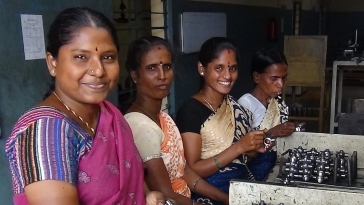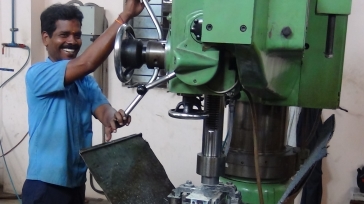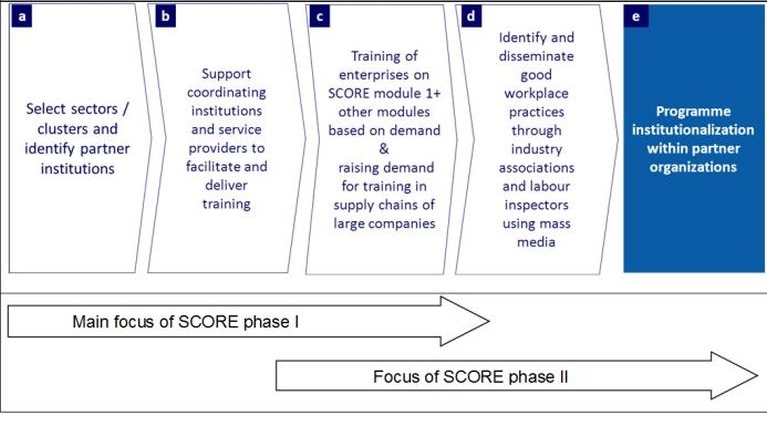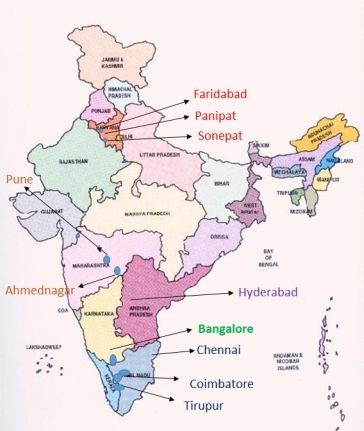SCORE Phase II - Sustaining Competitive and Responsible Enterprises Programme
The overall objective of the programme is to assist Small & Medium Enterprises to become more sustainable through being cleaner, more productive and competitive, and contribute in creation of more and better quality jobs in the economy.
Country context
As per Government of India (GOI) statistics, in India, 8 to 9 million additional young persons will join the labour force annually between 2012 and 2022. With jobs in the agriculture sector declining, India must create over 200 million jobs outside agriculture by 2025 implying that a large burden of job creation must fall on the manufacturing sector.
In 2014, GOI launched ‘Make in India’, a visionary program initiative to encourage multinationals, transnationals and national companies to manufacture their products in India with the primary objective of job creation by boosting the GDP growth. With 45 % of total industrial production, 40% of total exports and 37.54 % contribution to the GDP, the MSMEs in India are expected to play a critical role in supporting the realisation of the ‘Make in India’ vision. Currently, there are more than 36 million MSMEs in India (as per the fourth Census of MSMEs) providing employment to over 106.152 million persons (second largest after agriculture).
The ILO Country Office for India contributes to India’s efforts to accelerate competitiveness and growth of the MSME sector and in the creation of more and better quality jobs through intervention models such as SCORE. SCORE contributes to Outcome 2.2 ‘Improved policies and programmes on sustainable enterprise development and formalization’ under Priority 2 in the Decent Work Country Programme (DWCP) 2013-2017 and globally to P&B Output 3, Indicator 3.3: Sustainable Enterprises Create Productive and Decent Jobs.
SCORE project rationale
The ILO in support with its constituents and various partners, seeks to develop a better understanding among the businesses that productivity and competitiveness are intrinsically linked to working conditions. Studies show that enterprises who take action on the social and environmental impact of their operations enhance their reputations, reduce the costs of doing business and improve competitiveness.Project description
The SCORE programme is a global ILO Technical Cooperation Programme, headquartered in Geneva and is operational in 9 countries - China, Indonesia, Vietnam, India, South Africa, Ghana, Colombia, Bolivia and Peru. It is funded by the Swiss State Secretariat for Economic Affairs and the Norwegian Agency for Development Cooperation with Canada as donor for the project’s activities in Peru. Through this programme, the ILO is assisting government agencies, business service providers, industry associations and trade unions in emerging economies in Africa, Asia and Latin America to offer SCORE Training, the global technical tool specially designed by ILO, to Small and Medium Enterprises (SMEs).
SCORE training package comprises of 5 modules - Module 1: Workplace Cooperation which is the mandatory module and 4 optional modules which are Module 2: Quality, Module 3: Productivity through Cleaner Production, Module 4: Workforce Management for Cooperation and Business Success and Module 5: Safety and Health at Work: A Platform for Productivity. Each module resonates around a specific shop-floor productivity constraint faced by SMEs. The SCORE training product focusses on developing cooperative relations in the workplace as basic and necessary foundation for sustaining competitiveness. Each module is delivered in combination of class-room training, to be attended by a few workers and managers, followed by on-site coaching by ILO certified industry experts (i.e., SCORE Trainers) to help the enterprise adopt good management practices to enhance productivity. SCORE Module 1 on Workplace Cooperation mandatory for the SMEs to attend whereas the other Modules 2 to 5 are optional.
Project strategy
Building upon the phase 1 of the SCORE programme in India (October 2010-13), the main focus of the SCORE Phase II is on reaching programme sustainability i.e. institutionalization of the training programme within partner organizations (step e in the figure 1 below). The current service delivery model and outreach to a large number of enterprises is only feasible if the programme becomes part of the regular service portfolio of large national training providers. In August 2014, the ILO Country Office for India and the Federation of Indian Chambers of Commerce and Industries (FICCI), ILO’s employers partner in India, entered into a partnership to institutionalize SCORE in FICCI. SCORE training in India is now being offered by the FICCI to the SMEs with 30-300 employees in the sectors - light engineering, readymade garments, textiles and food processing. The training cost is shared between the participating SMEs, industry associations, corporate partner and ILO. The project is building a cadre of SCORE trainers in India for the effective delivery of SCORE training to the enterprises independent of technical assistance from ILO. Capacity building and awareness raising of the employers organizations, workers organizations and policy-makers on the promotion of good workplace practices in the SMEs is integral to SCORE implementation strategy.
